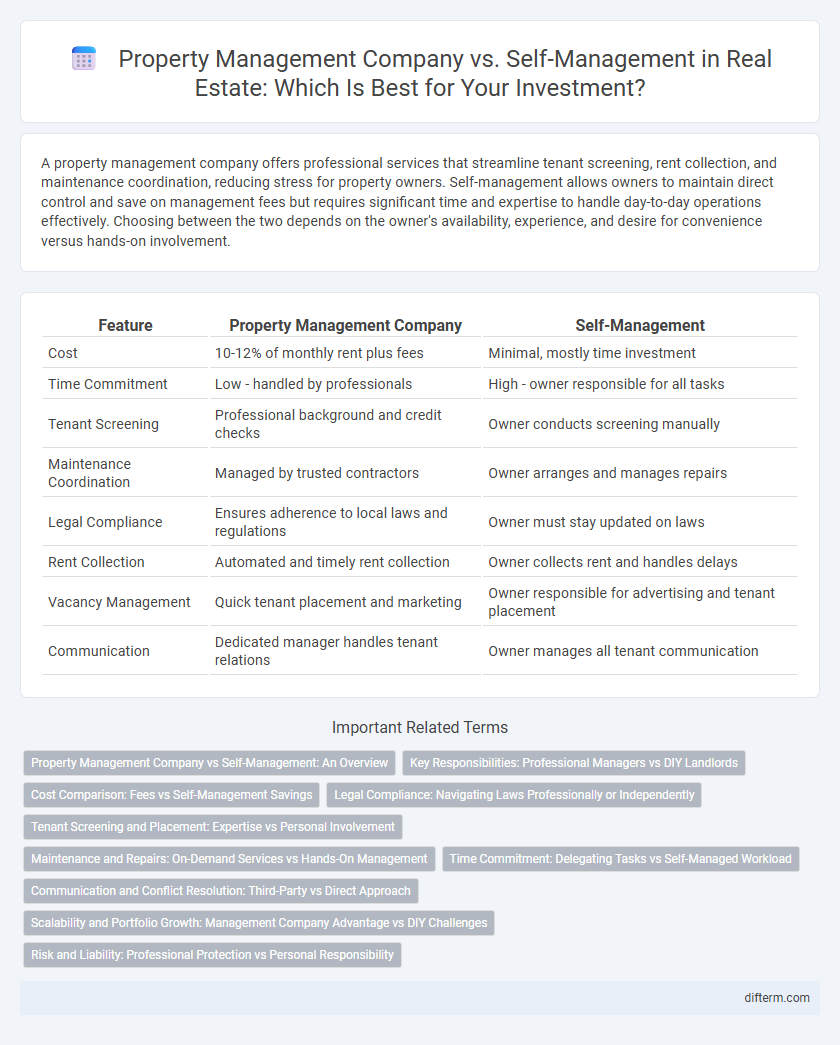A property management company offers professional services that streamline tenant screening, rent collection, and maintenance coordination, reducing stress for property owners. Self-management allows owners to maintain direct control and save on management fees but requires significant time and expertise to handle day-to-day operations effectively. Choosing between the two depends on the owner's availability, experience, and desire for convenience versus hands-on involvement.
Table of Comparison
| Feature | Property Management Company | Self-Management |
|---|---|---|
| Cost | 10-12% of monthly rent plus fees | Minimal, mostly time investment |
| Time Commitment | Low - handled by professionals | High - owner responsible for all tasks |
| Tenant Screening | Professional background and credit checks | Owner conducts screening manually |
| Maintenance Coordination | Managed by trusted contractors | Owner arranges and manages repairs |
| Legal Compliance | Ensures adherence to local laws and regulations | Owner must stay updated on laws |
| Rent Collection | Automated and timely rent collection | Owner collects rent and handles delays |
| Vacancy Management | Quick tenant placement and marketing | Owner responsible for advertising and tenant placement |
| Communication | Dedicated manager handles tenant relations | Owner manages all tenant communication |
Property Management Company vs Self-Management: An Overview
Property management companies offer expert services including tenant screening, rent collection, and maintenance coordination, ensuring efficient and compliant property operations. Self-management allows owners to control all aspects of their property directly, potentially saving management fees but requiring significant time and expertise. Choosing between a property management company and self-management depends on the owner's availability, knowledge, and capacity to handle the complexities of property leasing and upkeep.
Key Responsibilities: Professional Managers vs DIY Landlords
Professional property management companies handle tenant screening, rent collection, maintenance coordination, and legal compliance efficiently, reducing the risk of costly errors and vacancies. DIY landlords must manage these tasks themselves, often facing time-consuming challenges and potential regulatory pitfalls without specialized expertise. Leveraging a property management company enhances operational efficiency and ensures consistent property upkeep and tenant satisfaction.
Cost Comparison: Fees vs Self-Management Savings
Property management companies typically charge fees ranging from 8% to 12% of monthly rental income, covering tenant screening, maintenance coordination, and rent collection. Self-management eliminates these fees, potentially saving thousands annually, but requires significant time investment and expertise to handle legal compliance, emergency repairs, and tenant disputes effectively. Evaluating the cost-benefit depends on factors like rental property size, owner experience, and local market conditions.
Legal Compliance: Navigating Laws Professionally or Independently
Property management companies ensure legal compliance by staying updated on local landlord-tenant laws, fair housing regulations, and safety codes, reducing risks of costly lawsuits or fines. Self-management requires landlords to invest significant time in understanding evolving regulations, increasing the potential for unintentional violations and legal disputes. Professional property managers use specialized knowledge and resources to navigate complex legal environments, providing peace of mind and protecting investment assets.
Tenant Screening and Placement: Expertise vs Personal Involvement
Property management companies utilize advanced tenant screening tools and industry expertise to efficiently assess credit history, rental background, and employment verification, reducing the risk of problematic tenants and ensuring steady rental income. In contrast, self-management requires landlords to personally handle tenant screening, which can be time-consuming and prone to oversight due to limited access to comprehensive databases and experience. Professional placement services also streamline lease agreements and compliance with local regulations, enhancing tenant satisfaction and minimizing legal risks.
Maintenance and Repairs: On-Demand Services vs Hands-On Management
Property management companies offer on-demand maintenance and repairs through vetted professionals, ensuring swift response times and reducing downtime for tenants. Self-management requires hands-on involvement in scheduling, overseeing, and verifying repairs, which can be time-consuming and may lack consistent quality control. Utilizing a property management firm often leads to improved property upkeep and tenant satisfaction due to streamlined service coordination.
Time Commitment: Delegating Tasks vs Self-Managed Workload
Property management companies significantly reduce time commitment by delegating tasks such as tenant screening, rent collection, and maintenance coordination to experienced professionals. Self-management requires property owners to handle these responsibilities directly, often leading to increased workload and potential inefficiencies. Utilizing a property management service optimizes time by streamlining operations and minimizing daily administrative burdens.
Communication and Conflict Resolution: Third-Party vs Direct Approach
Property management companies streamline communication by acting as centralized points of contact between tenants and owners, using professional protocols and digital platforms to ensure timely issue resolution. Self-management offers direct interaction, which can foster personalized relationships but may risk miscommunication and delayed conflict resolution due to lack of experience or availability. Effective conflict resolution in third-party management benefits from trained mediators and standardized procedures, whereas self-managed properties rely heavily on the owner's negotiation skills and responsiveness.
Scalability and Portfolio Growth: Management Company Advantage vs DIY Challenges
Property management companies offer scalable solutions with professional systems and dedicated staff to handle multiple properties efficiently, fueling portfolio growth with streamlined maintenance, tenant screening, and rent collection processes. In contrast, self-management often limits scalability due to time constraints, lack of expertise, and challenges in handling increased tenant demands, which can stall portfolio expansion. Leveraging a property management company enhances operational efficiency and supports accelerated real estate investment growth.
Risk and Liability: Professional Protection vs Personal Responsibility
Property management companies offer professional protection by assuming liability for tenant disputes, maintenance issues, and regulatory compliance, reducing the owner's personal risk exposure. Self-management places full responsibility on the property owner, increasing the potential for costly legal challenges and financial losses due to lack of expertise in handling legal and operational risks. Engaging a property management firm ensures adherence to industry standards and mitigates risks through specialized knowledge and insurance coverage.
property management company vs self-management Infographic

 difterm.com
difterm.com